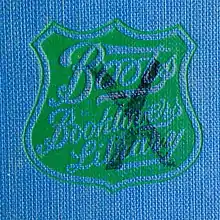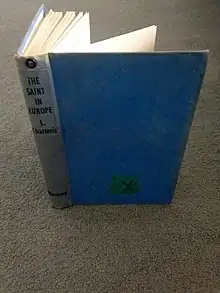Boots Book-Lovers' Library
Boots Book-Lovers' Library was a circulating library run by Boots the Chemist, a chain of pharmacies in the United Kingdom. It began in 1898, at the instigation of Jesse Boot's wife Florence, and closed in 1966, following the passage of the Public Libraries and Museums Act 1964, which required councils to provide free public libraries.

The lending libraries were established within branches of Boots across the country, employing dedicated library staff whose training included examinations on both librarianship and literature.[2] Boots' libraries displayed books for browsing on open shelves[3] at a time when many public libraries had closed access. A catalogue of the books available was first published in 1904.
Subscriptions were available in Classes A and B, the latter being restricted to borrowing books at least one year old, as well as a premium 'On Demand' subscription.[4]

Books carried the 'green shield' logo on the front and an eyelet at the top of the spine.[5] Membership tokens were rectangles of ivorine[6] with a string similar to a Treasury tag; the string could be secured through the eyelet so that the token acted as a bookmark.[7]
Boots also briefly reprinted classic books at the start of the 20th century under the imprint 'Pelham Library',[8] named after the flagship Boots shop on Pelham Street in Nottingham,[9] and later sold books as 'Boots the Booksellers'.
In popular culture
John Betjeman places Boots' libraries at the head of an ironic list of British national emblems:
Think of what our Nation stands for,
Books from Boots' and country lanes,
Free speech, free passes, class distinction,
Democracy and proper drains.— 'In Westminster Abbey' (1940), John Betjeman
The stage directions for the opening scene of Sir Noël Coward's 1936 play Still Life show the protagonist Laura Jesson 'reading a Boots library book at which she occasionally smiles'.[10] In the 1945 cinema adaptation Brief Encounter, Laura is seen visiting a branch of Boots to exchange her library book as part of her weekly routine.[11] In the 1948 film Here Come the Huggetts, Jane Huggett is librarian of the Boots Lending Library.
References
- "The hyphen and apostrophe slipped out of use in the postwar period in the interests of simplicity." Dugan, footnote 1, page 153
- Dugan, page 169
- Dugan, page 153; Winter, page 32
- Dugan, page 178; Winter, page 48
- Winter, page 38
- Dugan, page 163
- NottsLit; Potter
- Krygier, John, 'Pelham Library', A Series of Series (Archived 11 November 2017 at the Wayback Machine)
- Winter, page 73
- Dugan, page 170
- Dugan, page 170; Snoek-Brown, Jennifer, 'A brief encounter with a librarian', Reel Librarians (2011)
Further reading
- Dugan, Sally, 'Boots Book-Lovers' Library: Domesticating the Exotic and Building Provincial Literary Taste', Chapter 9 in Nicola Wilson (editor), The Book World: Selling and Distributing British Literature, 1900-1940 (Brill, 2016)
- Moody, Nickianne, 'Fashionable Design and Good Service: The Spinster Librarians at Boots Booklovers Library', pages 131-144 in Evelyn Kerslake and Nickianne Moody (editors), Gendering Library History (Liverpool John Moores University/Association for Research in Popular Fictions, 2000)
- Moody, Nickianne, 'Readers and Reading Patterns: Oral History and the Archive', Chapter 10 in Nicola Wilson (editor), The Book World: Selling and Distributing British Literature, 1900-1940 (Brill, 2016)
- NottsLit, 'Boots Booklovers' Library', 11 November 2017
- Potter, Terry, The Boots Circulating Library, The Letterpress Project, 28 July 2016 (Archived 11 November 2017 at the Wayback Machine)
- Winter, Jackie, Lipsticks and Library Books: The Story of Boots Booklovers' Library (Chantries Press, 2016)
- Wright, Judith, 'A History of Boots Booklovers' Library', Library and Information History Group Newsletter, series 4, no. 23 (Winter 2011), pages 17-19
| Wikimedia Commons has media related to Boots Book-Lovers' Library. |